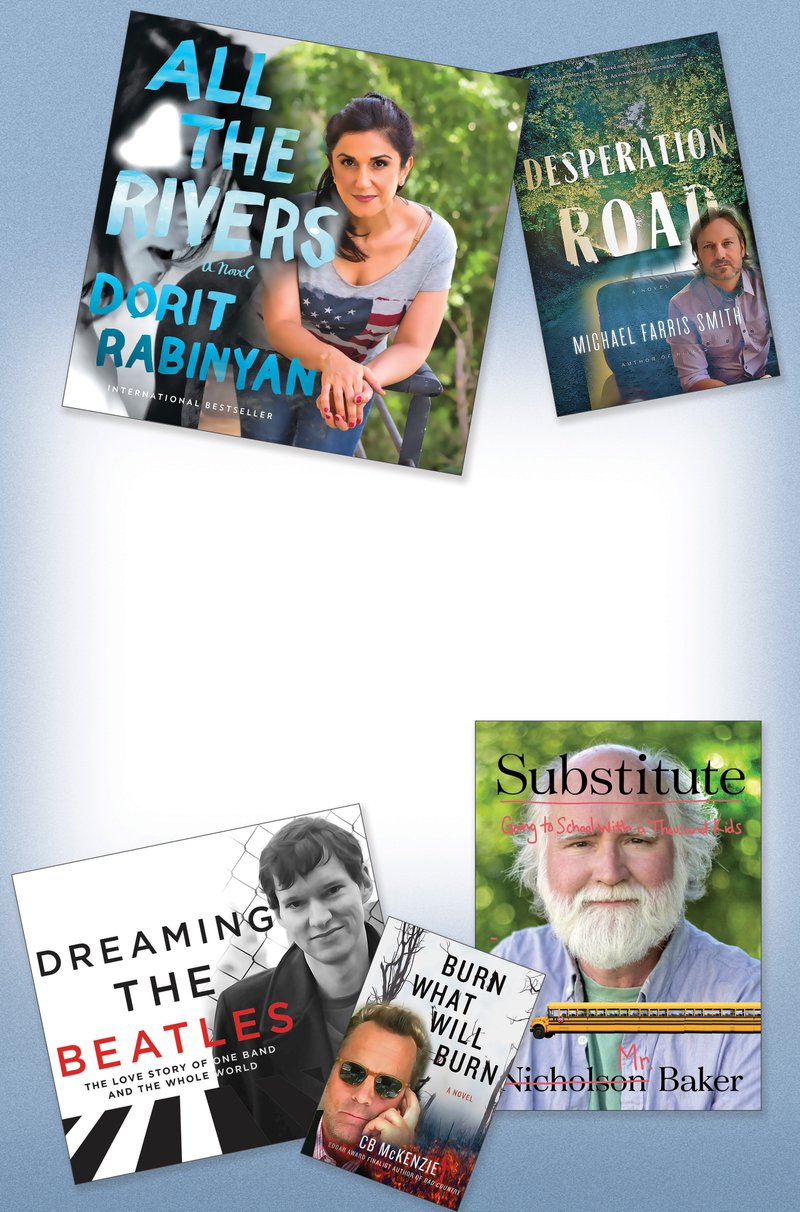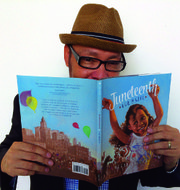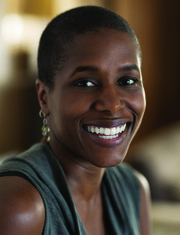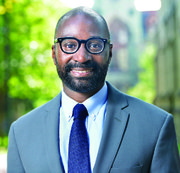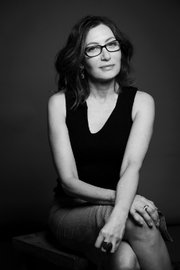There's a stand-up comedy bit from the late Bill Hicks where he's sitting in some 1980s Waffle House in somewhere America, reading a book when the waitress asks him, "What you readin' for?"
Hicks is taken aback. He's never been asked what he read for, only what he was reading.
[ARKANSAS LITERARY FESTIVAL: Interviews with five authors who will speak at Little Rock event]
Arkansas Literary
Festival
When: Thursday-April 30
Where: Central Arkansas Library System’s Main Library, other Little Rock venues
Most events are free.
(501) 918-3000
After some consideration, Hicks says, "You stumped me. I guess I read for a lot of reasons."
It's a question worth considering:
Why read?
To be smarter, more informed? To be cultured, well-rounded? To simply be entertained, thrilled? Yes. Yes. And yes.
There might be, conceivably, a million answers to the question, "What you readin' for?"
Whatever the reason, those who read could find the answer to that question at the 14th annual Arkansas Literary Festival, running Thursday through April 30 at locations around Little Rock. And those who don't read? Well, the festival is a good starting point for a well-worth-it hobby. And the mostly free festival is not all about books. There are events for everyone, with subjects from Lego to lingerie.
Here are five (short) interviews with authors who will be at the Arkansas Literary Festival, a project of the Central Arkansas Library System. A full schedule is available at www.arkansasliteraryfestival.org.
NICHOLSON BAKER
Nicholson Baker writes "all over the place." Sometimes in restaurants; sometimes in the car. All that writing has resulted in more than a dozen works of fiction and nonfiction,
including Human Smoke: The Beginnings of World War II, the End of Civilization and House of Holes, and appearances in The Atlantic and The New Yorker.
A winner of the National Book Critics Circle Award for 2001's Double Fold: Libraries and the Assault on Paper, Baker is currently working on a nonfiction book "about old, old, old secrets. Old Cold War secrets."
His latest is Substitute: Going to School With a Thousand Kids, where Baker spent 28 days substituting in Maine public schools.
Baker is at the Central Arkansas Library System's Ron Robinson Theater at 11:30 a.m. Saturday.
On writing every day
"I don't think I really started to figure out how to write until after I started writing every day. Occasionally I'm sick, or I only write a tortured email -- and there are times when I'm only rewriting, but essentially I try to do it every single day. The days I'm not expecting anything to happen are sometimes the days when the prose really picks up. And sometimes on the days when I get up in the morning and say, 'This is the day I really figure it all out,' it doesn't go as well. It's a question of showing up at the keyboard."
On what he learned while substitute teaching
"The only way for us to make progress with educational policy is to feel how difficult it is to make it through a school day. It's an endurance problem for kids and for teachers. Both groups are shouting their throats raw and trying to survive and avoid burnout. The learning that happens is almost incidental to all of the other crazy -- sometimes beautiful and funny and touching -- things that happen in classrooms. And sometimes really tragic things. My idea was to write a book that took you, the reader, into this snow globe of confusion and made you hear the shiny unexpected phrases that kids were just tossing into the air, and understand how they're trying to joke themselves into a state of alertness when they're exhausted. The moral is: Listen to what kids want to tell you and learn from it. Start from the fact that we don't necessarily need to make school more rigorous. Actually, we want it less rigorous, and a shorter day I think would be one of the best things we could possibly do for the student population of this country. Less is more."
C.B. MCKENZIE
It's challenging condensing a half-hour conversation with C.B. McKenzie onto the page -- the native Texan is a bit of a wild card, he'll admit. But the author is never, ever boring.
Having worked as a house painter, international model, professor, lifeguard, waiter and more, the Arkansas Tech University graduate is the author of two novels. His first, 2014's Bad Country, won the Hillerman Prize for best debut mystery set in the Southwest and was a finalist for the Edgar Award for best first novel. His second novel, 2016's Burn What Will Burn, is set in Arkansas.
McKenzie appears at the library's Cox Creative Center at 4 p.m. Saturday.
On Burn What Will Burn
"I probably started it in the '80s when I went to Arkansas Tech. My first wife and I lived out in the country, out in Dover. Right off of [Arkansas] 7, in the boonies. This was kind of my community. I mean it wasn't as bad as that. ... It's a beautiful place. That's the second book and it's not even really a mystery. It's like a mystery with no mystery to it, I guess. It's a novel. It's crime-driven. I mean, it's a crime novel but it's not really driven by the crime. The crime's just kind of in it. That's a totally different thing even from the first one. They are both noirish."
On how his diverse background has influenced his writing
"It hasn't. Is your idea the old-school idea that writers are people who have experienced a lot in their lives and then that informs their writing? That's sort of the old Hemingway idea, that you go to Spain, fight in the war, join the merchant marines, you don't get a real job, you pick apples in Washington, you work with the migrants, you move to New York City, become a male prostitute or whatever. But people like Jonathan Franzen haven't done any of those things. They are just writers. They just write. Novels is what they do. They don't really have a lot of life experiences. ... I'm a strange person. Does that inform my writing? Well, it informs everything. It informs the way I eat cereal. I'm just a writer. I'm just a novelist. They come in all shapes and sizes."
DORIT RABINYAN
Israeli author Dorit Rabinyan's latest novel is All the Rivers, a romance between an Israeli woman and a Palestinian man that was excluded from a list of required reading for Hebrew high school literature classes by the Israeli Ministry of Education.
Published in 2014 as Borderlife, the novel won the Bernstein Prize for young writers, an Israeli award for Hebrew literature. The English translation of the novel is being released Tuesday.
A native of Kfar Saba, Israel, Rabinyan's previous novels are Persian Brides and Strand of a Thousand Pearls.
Rabinyan appears at the CALS Main Library's Darragh Center at 11:30 a.m. Saturday.
On the idea for All the Rivers
"I do believe that every fiction work has to have a spark imported from life or you wouldn't be able to convince yourself in what you're writing, nevertheless the reader. ... The book evolves from an experience of a year I spent in New York and a group of Palestinian intellectuals and scholars and artists that I met there in Brooklyn. One of them was very special to me."
On her reaction to the Israeli Ministry of Education's decision on All the Rivers
"I was more than surprised. I was overwhelmed. This is the first time ever a book was banned from our curriculum for high school or for anything. We consider ourselves a democracy, and I consider myself a product of democracy so I wasn't expecting anything like this to happen. Everyone who cared about freedom of speech was overwhelmed and protested."
ROB SHEFFIELD
Ohio was really the first state in the country to get into David Bowie and is filled with excellent '70s Bowie stories -- that's just one fact Rob Sheffield knows about Ohio and Bowie, though he probably knows a few thousand more about Bowie, considering he wrote 2016's On Bowie.
A music, TV and pop culture critic at Rolling Stone since 1997, Sheffield is the author of several books, including Love Is a Mix Tape: Life and Loss, One Song at a Time; and Talking to Girls About Duran Duran: One Young Man's Quest for True Love and a Cooler Haircut.
His newest is Dreaming the Beatles: The Love Story of One Band and the Whole World, which is being released Tuesday.
Sheffield appears at 4 p.m. Saturday at the CALS Ron Robinson Theater.
On the genesis of Dreaming the Beatles
"I'm really fascinated that The Beatles really belong to today in a way that is really rare for any music. There's no sense that they belong to the past. It's funny when you see little kids listening to The Beatles. Over Christmas, I was visiting my nieces and nephews and my nephew had just built the Lego Yellow Submarine. It's so universal. My nieces can play guitar because of Taylor Swift. They played 'Blackbird.' To them, music is Katy Perry and Beyonce and Taylor Swift and The Beatles. There's no sense of The Beatles belonging to the past or belonging to ancient history."
On who his favorite Beatle is
"When I was growing up in the '80s, everybody had the same favorite Beatle and it was John [Lennon] because he was the cool one. And Paul, since he was putting out so many solo records and some were really cheesy, was the least-cool Beatle. But he was the one I kind of adopted as my contrarian, surly teen favorite. To me, Paul is this really weird, fascinating, complex guy who is so much more complex than people notice. I saw him last summer when he was on tour, in Washington, D.C., in a hockey rink and he played for three hours. I think he did like 40 songs and he ended with side two of Abbey Road, playing that all the way through. I thought, 'Everybody would have been happy with so much less. What drives him to work this hard every night? Why does he love being Paul McCartney so much and putting so much of himself into it?' It is kind of astonishing when you think about it. Nobody else his age has to work that hard. It's amazing."
MICHAEL FARRIS SMITH
It's early April and Mississippi author Michael Farris Smith is heading toward the Mississippi River, where he'll stay in a cabin and finish revisions on his forthcoming novel The Fighter, which will be released in April 2018.
Smith, whose writing has been compared to Ron Rash, Cormac McCarthy and Larry Brown, talks from Lemuria Books in Jackson, Miss., which lies about 150 miles southwest of his Columbus, Miss., home, where Smith teaches creative writing at Mississippi University for Women.
The 2014 winner of the Mississippi Author Award for Fiction and a native Mississippian, Smith's works include The Hands of Strangers, Rivers and his newest, the February release Desperation Road.
Smith appears at the CALS Ron Robinson Theater at 2:30 p.m. Saturday.
On the idea for Desperation Road starting with the image of characters Maben and Annelee walking down the interstate
"It was an image that wouldn't let go of me. I was immediately worried about them. I felt compassion for them. Empathy. Sympathy. And I was curious, too, about why they were there. When something grabs you like that, I've learned you need to harness yourself to it and see where it takes you. I think some of that had to do with me being the father of two girls. It would be one thing for [the mother] to be walking down the side of the interstate by herself carrying a garbage bag, but when you put a child in her other hand, it really raises the stakes quite a bit. That was an image I really couldn't get rid of so I just began to follow them and go with them and see what their story was."
On the influence the late Mississippi writer Larry Brown had on him
"During my time abroad [Smith lived in Europe during most of his 20s], I'd be back in Mississippi for a month or two, and I happened to be hanging out in Oxford during one of my breaks and I wandered over to Square Books and I picked up two books off the Mississippi writers table and that was Big Bad Love by Larry Brown, the story collection, and Ray, the novella, by Barry Hannah. I'd been reading Faulkner and the big names because I didn't really know anybody. I'd been reading Hemingway and Fitzgerald and Dickens and Faulkner. I liked reading Faulkner. I didn't always get it, but it gave me a connection to home. But when I picked up Big Bad Love and those stories by Brown, I ... remember it just punched me in the gut. This is what a contemporary Mississippi writer was writing about. I knew the people in his stories. I knew the small town atmosphere. I just really felt a connection to it."
Style on 04/23/2017
